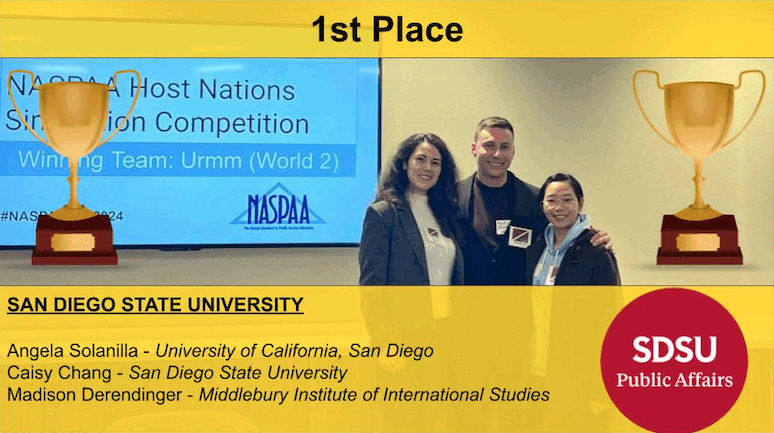Middlebury Team Makes Finals of National Anti-Extremism Competition
| by Mark C. Anderson
A multidisciplinary group of Institute students traveled to D.C. to present the AI tool they developed in the national finals of Invent2Prevent.

At the Middlebury Institute, students learn how to apply their content knowledge and skills to come up with practical solutions to complex problems.
Four Middlebury Institute students recently had the chance to put those skills to the test in a simulation of a refugree/migrant crisis that could have been ripped from the headlines.
MPA student Matt Stone and International Trade students Izabella Smith, Madison Derendinger, and Nadia Pshonyak, who is also completing a joint degree in International Policy and Development, were nominated by their professor, Dr. Wei Liang to attend this event.
They travelled to San Diego to participate in the Network of Schools of Public Policy, Affairs, and Administration (NASPAA) Host Nations Simulation at San Diego State University.
Students from the Institute split up on different teams, two of which made it to the top three and had a chance to present to the judges and participants. Madison Derendinger’s team placed first in the San Diego round and advanced to the Global Round, where they also placed first out of thirteen regional winners.
In the simulation, teams of students worked together to enact policies aimed at mitigating the crisis. Teams also presented a slideshow and a policy memo about their work. Institute students took on roles such as Prime Minister, Labor Secretary, and ATG Delegate in the Host Nations Simulation and gained invaluable skills related to negotiating and policymaking.
Every year, NASPAA organizes a Host Nations Simulation for students from the United States and the world to find their public servant voice, gain real-world experience without real-world risks, and proudly represent their school. The simulation typically happens in late-February or early-March and sees students coming together to deliver effective and equitable policies, consider the diverse needs of various populations, interpret data to evaluate and reorient policy decisions, practice inclusive decision-making, and navigate challenging and asymmetrical intergovernmental relations.
Attendees hailed from Oregon, Hawaii, other California universities, and Brazil, along with faculty from SDSU and three judges from the San Diego area. Participants were randomly split into teams of three or four, assigned roles, and tasked with representing a fictional country experiencing a refugee/migrant crisis. The simulation encompassed five rounds and was done through a simulation software program from DMS Academy which involved reading and interpreting data to enact the best policies for one’s country. After each round, a country’s indices were updated based on policies enacted related to political stress, human rights, migrant employment, GDP growth, equality, and the like. Each country was also given a set budget and one of the goals was to spend as much of your budget as possible; you could also request funds from other countries.
During the rounds, judges circulated the room and asked each country various questions related to what they were doing or what their thoughts were on certain issues related to the simulation. The answers to the questions along with the scores from the enacted policies were calculated to determine the top three teams. Each team also had to prepare a presentation and a policy memo explaining their decisions. Only the top three teams presented their findings to the bigger group.
| by Mark C. Anderson
A multidisciplinary group of Institute students traveled to D.C. to present the AI tool they developed in the national finals of Invent2Prevent.
| by Jason Warburg
Thirty-five Middlebury Institute students were joined by students and faculty from other area institutions for a weekend-long exercise simulating diplomatic negotiations during an international crisis.
| by Nadia Pshonyak
This semester more than eighty Middlebury Institute students are participating in our distinguished semester-long experiential learning and practicum courses. Students are working around the globe with organizations making a positive impact in various fields while continuing their studies here at the Middlebury Institute of International Studies.